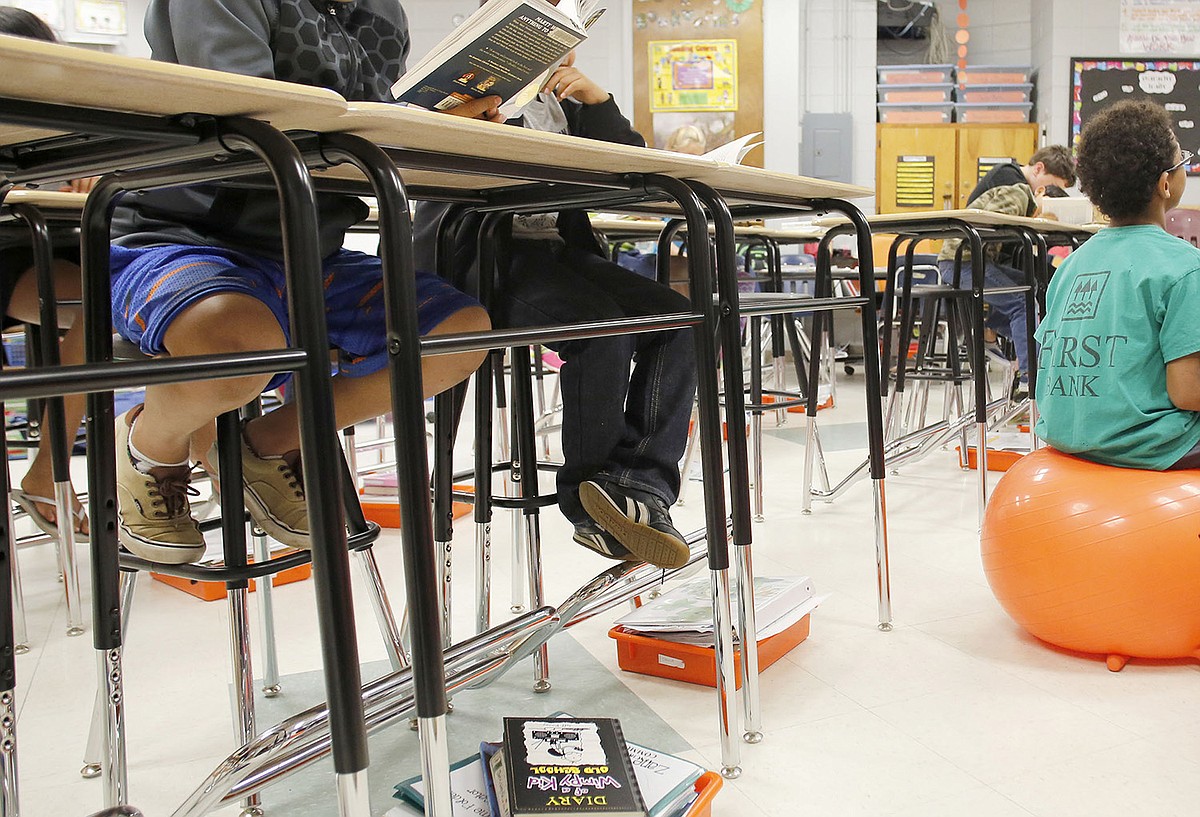While all states need to do a better job of preparing and supporting elementary school educators to teach math, Arkansas outperforms most in its efforts to ensure teacher effectiveness in the subject, according to the National Council on Teacher Quality.
In a report released by the Washington, D.C.,-based research organization Tuesday, the Natural State and Alabama were listed as the only two states in the U.S. taking a comprehensive, coherent approach to preparing teachers for math instruction in the classroom.
“We’re kind of looking at the arc of a teacher’s career from before they get into the classroom to once they’re in the classroom, all focused on this question of, ‘How can we ensure that teachers are well prepared and well supported to be effective in teaching math in elementary school,’” said council President Heather Peske.
The group’s goal was to analyze state laws, regulations, policies and tactics that either aid or hinder the strengthening of teachers’ ability to teach math well, Peske added.
Each state was rated based on how their policies aligned with five policy levers — carried out through 16 associated actions — most important for improving math instruction, and consequently, math understanding for students, according to the report.
The policy levers identified were setting specific, detailed math standards for teacher preparation programs offered by colleges and universities; adequately reviewing the preparation programs; requiring all elementary teacher candidates to pass a strong math licensure test; requiring districts to select high-quality math curricula aligned to state standards; and professional development and ongoing support for teachers.
The key actions supporting these policies ranged from whether the state requires elementary teacher preparation programs to address math-specific teaching methods to whether states are publishing data on how many teacher candidates are passing math licensure exams.
Arkansas ranked above the national average across most of the policy levers, earning a “strong” rating for setting clear and detailed math standards and for adopting a strong math licensure test that all teacher candidates must pass. The state’s review of its teacher preparation programs was initially given a “moderate” rating, but that was increased to a strong one after the council discovered Arkansas maintains full authority over program approval, a spokesperson for the council told the Arkansas Democrat-Gazette last week.
This change in policy lever rating resulted in Arkansas’ overall rating shifting from “moderate” to “strong.”
A main finding of the council in its report was that just two states utilize a comprehensive approach to math instruction, Peske said, adding that “it’s really critical that” teachers are getting content knowledge which aligns with the four key math topics: numbers and operations; algebraic thinking; geometry and measurement; and data analysis and probability.
Arkansas “is specific and detailed in telling teacher preparation programs what they need to do in terms of these four key math content topics, and the state also requires elementary teacher prep programs to address the methods of teaching math — or what we call math pedagogy,” Peske said.
Not only does Arkansas provide detailed standards, but the state also “follows through” by requiring a review of preparation programs, syllabi and coursework to ensure math standards are reflected in what aspiring teachers are learning, Peske said.
COUNCIL’S RECOMMENDATIONS
When it comes to requiring districts to select high-quality instructional materials for math as well as providing professional learning and coaching once teachers are in the classroom, Arkansas has some room for improvement, the council said in its report.
“High quality math curriculum along with supporting implementation can help to increase the effectiveness of a teacher,” Peske said, noting that the council is “urging” states to require school districts to utilize materials considered high quality.
Peske added that “Arkansas is missing an opportunity to really support teachers” by failing to collect and publish data on the curriculum that districts are using as well.
Support around the implementation of high-quality instructional materials as well as math coaches and specialists in schools would also improve the state’s overall approach to educator effectiveness in math, Peske said.
Arkansas Education Secretary Jacob Oliva said that while districts are given leeway to select their own curriculum for math, the state Department of Education does provide a recommended list of high-quality materials school districts are encouraged to choose from.
Arkansas has taken some of the steps recommended by the national council’s report on math instruction in its approach to literacy education, and Oliva said similar strategies could be implemented for math instruction in the future.
For instance the state requires districts to choose from a list high-quality literacy materials and publishes information what materials districts are using.
Arkansas has been moving toward the “science of reading,” or a research-based strategy designed to teach students how to read, Oliva said, adding that the state’s efforts include “making sure that all of our professional development and instruction materials are aligned” with the national method of teaching literacy.
“It’s almost like we are getting to this point on a national educational landscape around the need to do a big push around the science of math, like there was a big push around the science of reading,” he said. “A lot of people are realizing that it’s a balanced approach between the core content areas.
“Those third-grade benchmarks on if students can read at or above grade level are grade-level predictors for future success. It’s going to be the same way for math.”
THE LEARNS ACT
Beyond the policy areas mentioned in the national council report, the Arkansas LEARNS Act of 2023 established several programs aimed at improving student achievement in both math and literacy.
The law established the High-Impact Tutoring Pilot Program, which tasks the Education Department’s Division of Elementary and Secondary Education providing competitive grant funding to school districts to cover costs for K-12 math or literacy tutoring.
The education secretary added that levels of support needed vary across classrooms, grade levels and schools, meaning that a “unified, coordinated system” to address student-specific needs from kindergarten through 12th grade is needed.
Once teachers are in the classroom, Oliva noted that educators have access to myriad professional learning opportunities and resources geared toward state student and educator standards.
He also noted that the Merit Teacher Incentive Fund Program established through the LEARNS Act awards up to $10,000 in annual bonuses to educators who demonstrate a substantial impact on student growth, mentor aspiring teachers, teach a subject within a critical teacher shortage area or teach in a geographical area with a teacher shortage.
Oliva said the state asks recipients to share best strategies with the department and other educators.
“The more you can build out a teacher’s toolbox, the better off they’re going to be to support all the different needs of the students,” Oliva said.
Arkansas provided more than 120 literacy coaches to K-3 teachers in D- and F-rated schools across the state during the 2024-25 school year — another provision of the state’s K-12 education overhaul act from 2023. Oliva noted that, depending on whether literacy coaches prove to have a positive impact on student assessment scores, the state “might” consider implementing similar measures for math.
MATH ACHIEVEMENT
“Right now, in Arkansas and across the nation, our students are not achieving well in math,” Peske said. “And if we want students to be successful, we need to better prepare and better support elementary teachers in their math instruction.”
Beyond improving students’ assessment scores, stronger math skills lead to better reading scores and college readiness, which positions students to achieve higher earnings later on, she added.
Between 2019 and 2024, average math scores from a representative sample of Arkansas fourth-graders showed no significant change despite a nationwide trend showing an average overall decrease in math scores during the same time, according to results from the 2024 National Assessment of Education Progress.
The state’s scores also remained relatively unchanged between 2022 and 2024 when the national trend showed an increase.
According to the 2024 results, Arkansas fourth-graders performed, on average, 7 points below the national average, the largest gap between math scores of Arkansas test takers and the national average since 2000.
Nationally, students showed small gains, particularly in math and among higher-performing students, between 2022 and 2024, with Alabama being the only state to see fourth-grade math scores last year exceed pre-pandemic scores.
“We know there are opportunities to improve” on state standardized assessments and national assessments, Oliva said.
“So when we look at those recommended actions for steps to take, we want to be reflective and be diligent, make sure we’re able to implement what we know is going to be effective for our students,” he added.
As for states’ educator preparedness policies for related to math instruction, a majority of states do not provide clear and detailed standards for teacher preparation programs, use a strong or acceptable math licensure test or require districts to select high-quality math curricula, according to the national council’s report released Tuesday.
Seven states — Arizona, Hawaii, Maine, Missouri, Montana, Nebraska and New Hampshire — were rated unacceptable by the council for their “lack of math policy action” across all five policy levers, the report stated.

































